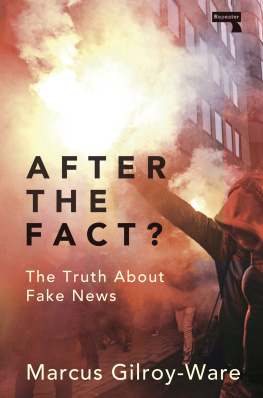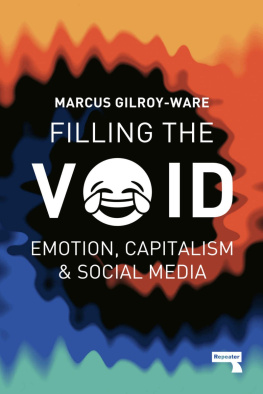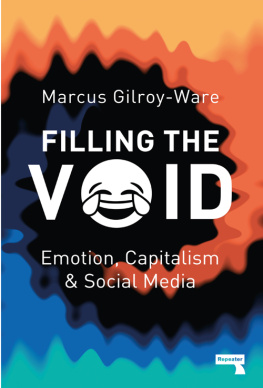Marcus Gilroy-Ware - After the Fact?
Here you can read online Marcus Gilroy-Ware - After the Fact? full text of the book (entire story) in english for free. Download pdf and epub, get meaning, cover and reviews about this ebook. year: 2020, publisher: Watkins Media, genre: Politics. Description of the work, (preface) as well as reviews are available. Best literature library LitArk.com created for fans of good reading and offers a wide selection of genres:
Romance novel
Science fiction
Adventure
Detective
Science
History
Home and family
Prose
Art
Politics
Computer
Non-fiction
Religion
Business
Children
Humor
Choose a favorite category and find really read worthwhile books. Enjoy immersion in the world of imagination, feel the emotions of the characters or learn something new for yourself, make an fascinating discovery.
- Book:After the Fact?
- Author:
- Publisher:Watkins Media
- Genre:
- Year:2020
- Rating:4 / 5
- Favourites:Add to favourites
- Your mark:
- 80
- 1
- 2
- 3
- 4
- 5
After the Fact?: summary, description and annotation
We offer to read an annotation, description, summary or preface (depends on what the author of the book "After the Fact?" wrote himself). If you haven't found the necessary information about the book — write in the comments, we will try to find it.
After the Fact? — read online for free the complete book (whole text) full work
Below is the text of the book, divided by pages. System saving the place of the last page read, allows you to conveniently read the book "After the Fact?" online for free, without having to search again every time where you left off. Put a bookmark, and you can go to the page where you finished reading at any time.
Font size:
Interval:
Bookmark:



Published by Repeater Books
An imprint of Watkins Media Ltd
Unit 11 Shepperton House
88-89 Shepperton Road
London
N1 3DF
www.repeaterbooks.com
A Repeater Books paperback original 2020
Distributed in the United States by Random House, Inc., New York.
Copyright Marcus Gilroy-Ware 2020
Marcus Gilroy-Ware asserts the moral right to be identified as the author of this work.
ISBN: 9781912248735
Ebook ISBN: 9781912248742
All rights reserved. No part of this publication may be reproduced, stored in a retrieval system, or transmitted, in any form or by any means, electronic, mechanical, photocopying, recording or otherwise, without the prior permission of the publishers.
This book is sold subject to the condition that it shall not, by way of trade or otherwise, be lent, re-sold, hired out or otherwise circulated without the publishers prior consent in any form of binding or cover other than that in which it is published and without a similar condition including this condition being imposed on the subsequent purchaser.
To my parents, my sister, and my chosen family
CONTENTS
Foreword
Dear Reader,
The subtitle of this book, the truth about fake news, is intentionally playful and light-hearted. But behind this mischievous subtitle is a genuine intention to understand the urgent problems of misinformation and disinformation the inadvertent and deliberate forms of falsehood that the phrase fake news indirectly refers to.
The most important truth about fake news is that it is not actually a useful or precise term for talking about misinformation and disinformation at all. As a number of people have pointed out, most notably the communication scholar Claire Wardle (2017), the phrase is not only conceptually uncertain, but fundamentally flawed. There just isnt any single thing called fake news the phrase has simply become a pejorative label for information, misinformation or disinformation we have a particular objection to. After the US election in 2016, Donald Trump and the people working for him became well-known for dismissing unfavourable coverage as fake news, but this sense of the phrase has since become a common occurrence in political discussion across the English-speaking world. In the UK Parliament in May 2018, for instance, then Secretary of State for Health Jeremy Hunt dismissed claims that the UKs National Health Service was being privatised as fake news (Hansard, 2018). This kind of explicit dismissal of factually accurate information heralded an increasingly emboldened refusal to acknowledge or admit basic facts about the world, regardless of the evidence. This kind of factual denial became common not only in the language of certain politicians, but in the thinking and political discussion of the people voting for them as well.
As far as the politicians, CEOs, and other figures in power dismissing information as fake news when it was harmful to their interests, this kind of cynical usage of the phrase was only possible because it also had an entirely different meaning. Trump may have been quick to reject unfavourable coverage as fake news, but after he was elected, there was a panic amongst some of those who had opposed his rise to power that certain types of hoaxes and other deliberate forms of disinformation, published online to look as much as possible like actual news websites, might have been a big part of the reason that Donald Trump was elected at all. Google Trends, the data analysis tool that shows how many people are searching for a given term at any particular time, indicates a huge spike in searches for the phrase fake news in the weeks after Donald Trump won the 2016 election. It was at this moment that the phrase fake news really arrived in the English language. Just at a time when people were already learning that inconvenient facts could be simply denied, the phrase fake news was, in at least two different senses, part of the way the world made sense of this somewhat shocking outcome after the fact . But here too, just as with the dismissive usage favoured by Trump, there was misinformation in how this diagnosis was formulated. As we will see in the first chapter of this book, there were numerous, longstanding political and cultural issues, studied by political scientists for decades, that contributed to Trumps victory, and those of other politicians using a similar toolkit. The amplified panic around a malevolent new online phenomenon called fake news having largely caused Trump to be elected was simplistic and misleading, in the way that technologies are often blamed for complex political problems. Even worse, normalising this phrase into the language at that moment actually made it easier for political leaders to carry on dismissing inconvenient truths as fake news, and thereby implying that all journalists were potentially unreliable and deceitful.
Meanwhile, journalism itself was facing its own crisis, and some journalists had become lazy, cynical, out of touch or just plain overworked, so professional journalism wasnt necessarily very reliable either. Even if fake wasnt the right term, there was no shortage of bad journalism, which made Trump and others cynical dismissal of their work easier. By now, with the phrase fake news well and truly incorporated into common parlance, even the very best journalism could be labelled as fake by politicians who did not want to be held account by it, all because of a simplistic, lazy analysis of how Trump and similar politicians had supposedly been elected because of technology and genuinely fake news articles an analysis that these politicians themselves had appropriated to their advantage in order to attack real journalism. Quickly, the picture gets very complicated, and all because several different phenomena share one simple two-word phrase. The reality is that misinformation and disinformation are everywhere, and the whole idea of fake news suggests that even the way we talk about misinformation and disinformation is itself misinformed. Yes, fake news is fake news .
The world should have swiftly moved on from the idea of fake news, but the term proved remarkably persistent, perhaps because there was no easy way of referring to the prevalence of misinformation and disinformation that had become so conspicuous at that moment. The first step to moving on is finding something better, and so far as the analysis of misinformation and disinformation is concerned, that is the goal of this book. And once we have let go of the unhelpful phrase fake news, save as a piece of language that deserves a degree of analysis in terms of how and when it is used, far more interesting questions and problems arise.
Some crises produce new understanding. After COVID-19 arrived, the world came to learn at least a little bit more about what a virus actually is and how it attacks the body. But there is another crisis of information that by its very nature prevents us from understanding it, and which has served to obscure and enable the insistent forces that have remade the world around ruthless free markets and also driven us towards fascist presidents, rising seas, raging wildfires and our unpreparedness for the pandemic itself.
This misinformation and disinformation was not simply the fact of people believing inaccurate information they read on Facebook or being misled by some devious Russian government operatives, much as these were a part of the picture. Instead, what we see is a much more complicated and interesting arrangement of deeply held, culturally engrained forms of misinformation that allowed this tension to carry on building until these dramatic results suddenly arrived in quick succession. There is no possibility of understanding fake news unless we make sense of this broader crisis.
Next pageFont size:
Interval:
Bookmark:
Similar books «After the Fact?»
Look at similar books to After the Fact?. We have selected literature similar in name and meaning in the hope of providing readers with more options to find new, interesting, not yet read works.
Discussion, reviews of the book After the Fact? and just readers' own opinions. Leave your comments, write what you think about the work, its meaning or the main characters. Specify what exactly you liked and what you didn't like, and why you think so.











